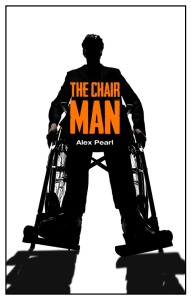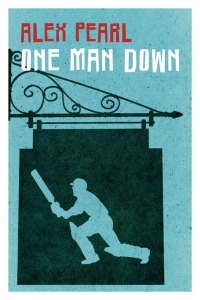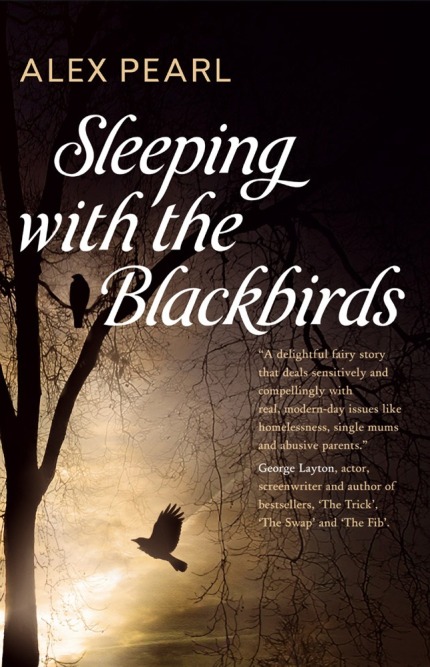
You know, I ‘meet’ some lovely folk either virtually or in real life as a result of blogging and Alex Pearl is one of the best. I’m delighted to welcome Alex to Linda’s Book Bag today to chat with me about one of his books.
Let’s see what he told me:
Staying in with Alex Pearl
Welcome to Linda’s Book Bag Alex. Thank you for agreeing to stay in with me.
Thank you for having me over, Linda.
Tell me, which of your books have you brought along to share this evening and why have you chosen it?
I was going to bring along one of my recent novels but ended up bringing my very first simply because it was the one that got the ball rolling, as it were. It’s a novella for children and parents and its title is Sleeping with the Blackbirds. It bears no resemblance to my more recent novels that include a fairly dark thriller based on the 7/7 London terrorist attack, and two comic murder mysteries set in the London advertising scene of the ‘80s.
But I suppose there are themes like family dysfunction, fractured relationships and deceit that seem to creep into all my novels. That’s not to say that they are all terribly dark because they’re not, but I suppose their inclusion invariably makes for interesting and credible storytelling.
Those sound like universal themes Alex. How did you come to write Sleeping with the Blackbirds?
The story behind Sleeping with the Blackbirds is one I’ve shared several times over because it’s a little out of the ordinary. You see, I wrote it almost by accident back in 2011. In fact, it’s no exaggeration to say that I started writing it as a way of simply occupying my mind and looking busy when the advertising agency I was then working for was in turmoil. For most of my professional life, I had been employed as a copywriter writing ads for agencies with my art college partner with whom I had worked for over 30 years. In 2011 the large agency we were at suddenly announced that it was entering into the process of a global merger with one of New York’s oldest agencies. One bright spark at the time equated this merger of ailing giants to the Hindenburg coming to the rescue of the Titanic.
Oh dear! What happened?
As a result of this massive merger, work dried up and copywriters like myself were left twiddling our thumbs. To make matters worse, my art director with whom I had worked since we started in 1980, decided to leave the industry entirely and become an artist. So to some extent, writing something for my amusement was a form of escapism. It was also an opportunity to write something that no client or account director would be able to change for the worse. This is the constant bane of copywriters’ lives. We all have to fight for our work but invariably make compromises and see our ideas including headlines and body copy watered down. And one of the things I particularly disliked was being told that the tone of my copy wasn’t modern enough. Call me old-fashioned but I’m not a big fan of adopting the language of the street and being provocative to simply make a lot of noise and turn heads. Campaigns like the infamous FCUK campaign for French Connection UK in my humble opinion are pretty awful. Other than getting an expletive into every headline on billboards, I’ve no idea what French Connection was trying to do. And it certainly wasn’t saying anything about the brand that could be construed as being positive.
I agree. Trying to shock for the sake of it feels unintelligent to me. Also, I’ve been having a debate recently about the fact I don’t want to tell the plot of a novel in my reviews. Sometimes you have to fight your own corner.
So when writing this story while supposedly at work I deliberately set out to write in a style redolent of writers like Clive King and Richmal Crompton. I’d argue that their writing isn’t old-fashioned so much as timeless, and their influence is evident in some of the most successful writers today including J.K. Rowling.
Having written Sleeping with the Blackbirds what can we expect from an evening in with it?
Sleeping with the Blackbirds is about an 11-year-old schoolboy Roy Nuttersley who has been dealt a pretty raw deal. While hideous parents show him precious little in the way of love and affection, school bullies make his life a misery. So Roy takes comfort in looking after the birds in his garden, and in return, the birds hatch a series of ambitious schemes to protect their new friend. As with the best-laid plans, however, these get blown completely off course – and as a result, the lives of both Roy and his arch tormentor, Harry Hodges are turned upside down – but in a surprisingly good way.
Sleeping with the Blackbirds sounds super. How did it get from being a distraction for you to being published?
By the time I was eventually given my marching orders from the agency, I had been writing this modern-day urban fantasy for 12 months. So on parting company with my erstwhile employer, I carried out of the building my modest crate of possessions including a few laminated press ads, a battered Collins Dictionary and a thick file of A4 typed sheets entitled Sleeping with the Blackbirds. I hadn’t thought about publishing it until I finished writing and it was something I did not know about. Like all writers writing in a vacuum, I couldn’t be sure if it was any good and worthy of publishing. My daughter had read it enthusiastically and enjoyed it. But nobody else had read it. So I racked my brains. Who could I ask to read it who knows about writing? And then I thought of George Layton the actor and writer who I used to use quite a lot back in the late 80s for voice-overs. George is a very talented writer and his collections of semi-autobiographical short stories about a child growing up in Manchester after the war (The Fib, The Swap, and The Trick) are wonderful and have been included on the national school curriculum. It was a bit of a longshot but I searched for him online and found a contact email address on his website, so I sent him a cheeky short message in the vain hope that he might respond. To my astonishment he replied the next day. And I remember very clearly the first line of his email:
Dear Alex,
I’d be lying if I said I remembered you…
This made me chuckle.
Me too. What else did he say?
But he then went on to say that he’d be more than happy to read through my manuscript and asked if I could pop it over to him one evening. As luck would have it, he lived no more than 10 minutes away from me by car, so a few days later, I went over with my manuscript and knocked on his door. He answered and beckoned me in. He was exactly as I remembered him – very charming and chatty. He sat me down in a conservatory and offered me a generous glass of red wine. And we chatted for about an hour. He was catching a train to Manchester the following day and said he’d read my manuscript on the train and get back to me. He was as good as his word. A couple of days later he sent me an email saying that he’d enjoyed it and wanted to share it with his agent. And then went as far as asking if I’d like him to write a byline when it gets published to stick on the front cover.
So did this lead to immediate publication?
Having received such words of encouragement from a highly respected and critically acclaimed bestseller does wonders to your confidence, but it was all to be short-lived. From that point onwards, every letter I received back from literary agents (including) George’s rejected my submission. So it was at this point that I considered publishing through a small independent publisher called PenPress in Brighton that an old work colleague and good friend Hugh Salmon who was now the co-founder of Lovereading.co.uk, had told me about.
Oo! We have something in common. Reviewing for Lovereading.co.uk was what got me into blogging and my first ever post was about them!
PenPress duly published the book as a paperback and I arranged a legal contract with the publisher to get them to donate my royalties directly to Centrepoint, the homeless charity for young people. This seemed like a fitting charity since the book touches on the subject of homelessness. However, it was shortly after this that my wife woke up one morning and couldn’t move. 24 hours later she was having emergency surgery by one of the UK’s leading neurologists, Mr Colin Shief. She had a benign spinal tumour on her spine and she’d never be able to walk again. Our lives were thrown into turmoil and it was some years before I’d discover that no royalties had been paid to Centrepoint by the publisher. To this day, I don’t know how many, if any, copies were ever sold. The publisher went out of business in 2014. So I subsequently self-published through Amazon’s CreatSpace (now Kindle Direct Publishing).
Goodness me! That sounds like a story of its own right there. I’m so sorry to hear about your wife.
It was later longlisted by the Millennium Book Viral Awards and selected by The Indie Author Project for distribution to libraries across the US and Canada. A good friend also kindly made a rather lovely promotional video and arranged for the English actor Nigel Havers to read a few extracts from the book. You can watch and listen to these here.
That must have been very exciting. Did others give their views too?
Eventually, the book would garner further endorsements. Here is a small sample:
A delightful fairy story that deals sensitively and compellingly with real, modern-day issues like homelessness, single mums and abusive parents.
George Layton, actor, screenwriter and author
Its wonderful images and thought-provoking scenes moved me to tears.
Bramwell Tovey,
Grammy and Juno Award-winning composer, conductor and broadcaster
I devoured this wonderful middle-grade novel in less than 24 hours, and I loved it, though (or perhaps because) it turned out to be far more challenging than I originally thought it would be. Deeper. More profound. Touching on topics such as bullying, intellectual disabilities, illegitimacy, and parents in the prison system, it couldn’t be more contemporary, yet it somehow has that old-fashioned feel so beloved by most fantasy readers.
Kelly Wittmann, author of An Authentic Experience
Beautifully written, poignant and magical, Alex Pearl’s writing style flows with the hand of a seasoned veteran. It pulls you in and never lets go.
Patrick Hodges, author of Jushua’s Island and The Bax Mysteries
I really loved this novel. I laughed out loud multiple times (which I rarely do while reading) and I was very moved at times as well.
Valerie Cotnoir, author of Your Home is Here, The War Within, Everlasting and Bridget’s Journey
The strength of the author’s voice held me captivated long after turning the last page. With the wit of JK Rowling, Alex Pearl has definitely earned his place in the young adult fiction hall of fame.
Lisa McCombs, Readers’ Favorite
You must be delighted with those reactions Alex.
What else have you brought along and why have you brought it?
I thought I’d bring along a Victorian paperweight that used to belong to my grandmother. And the reason I’ve brought it is very simple. It was the object, which was the subject of a short piece I wrote and presented, on the last day of an intense three-day writing course back in 2009. The course was arranged by Orange the telecommunications company (now EE), which was one of the clients I used to write for quite extensively and the workshop itself was run by the writer John Simmons. As the only bloke in attendance, I stood out like a sore thumb, and from the outset, we were tasked with a variety of challenging writing tasks with very tight deadlines, some of which were no more than two minutes. Among other things, we had to pen an opening paragraph to a novel, a business letter, a piece of poetry, copy for a press ad, a radio script, a presentation, a speech, and so on. And we had to present our work to the rest of the class at the end of each task. As the course progressed and the group relaxed, we all got to know each other a little better, and the quality of the writing steadily improved as a result.
That sounds like a baptism of fire!
We were told from the off that we would all be expected to use our time outside the workshop to develop a piece about a particular item that had special personal associations or memories attached to it. And on the final day we would all have five minutes each to read our compositions to the rest of the class.
The piece I wrote revolved around an old Victorian paperweight that had featured in my childhood, and like many other contributions presented on that final day, mine was loaded with emotion. The exercise was liberating and taught me that any subject – no matter how seemingly mundane, can form the basis of a compelling and engaging piece of writing. And it was this short piece, Family Reflections, that became one of the first pieces to appear on my blog. http://rhubarbrabbit.blogspot.co.uk
I love the fact your blog is rhubarbrabbit! Are you prepared to share that early paperweight piece with us Alex?
You can read it here:
Family Reflections
It was purchased before the war by a balding, stocky man with a warm smile and a booming, resonant voice. His name was Bertram Davis – though his original Russian surname was the more exotic Bolzwinick. He was the grandfather I never knew. By all accounts, he was the life and soul of the party; a witty chap with a story to tell and a joke to crack. Until that is, life was cruelly cut short by asthma at the tender age of 54.
I was born into this world five years after his departure. According to my grandmother, Bert would spend many happy hours pottering in dusty antique shops on Mile End Road and was in the habit of buying things on a whim.
As a young child, I remember setting eyes on my grandfather’s purchase and being drawn by its mesmerising contents and the way it magnified and distorted itself. This shiny, glassy orb with its intricate geometry of bright lapis lazuli, pink and white sunk deep into a sea of solid glass, never ceased to fascinate my young eyes. How did the coloured glass get inside the see-through glass? And how could this iridescent globule of sheer beauty have no more meaningful role in life than a mere paperweight?
For many years it was the family tradition for all my uncles and aunts and cousins on my mother’s side of the family to descend in droves on my grandmother’s house every Saturday afternoon for tea. It was invariably a jovial affair with lively children, lively conversation, a real fire sizzling and crackling in the grate and, of course, my grandmother’s famous apple and blackberry pie with its delicate coat of latticed pastry.
My grandmother was a fiercely independent woman with a heart of gold and a particularly soft spot for her short-sighted grandson. So when she passed away quite suddenly and unexpectedly when I was 14, Saturday afternoons never quite felt the same again.
I can recollect helping my father clear her large Victorian house and standing on the threshold of the sitting room where the fire once danced and laughter once filled the air. All that was left was a bare room with bare floorboards. A room stripped of its personality; stripped of life itself.
Some weeks later the paperweight that had sat for so many years on my grandmother’s sideboard, now found a new home on my bedroom desk. Sometimes I look into it and try and make out fleeting reflections of those joyful childhood memories.
Today, 35 years on my mother, now showing the early signs of dementia, lets slip the darkest of family secrets. Her father with whom she was incredibly close did not die from asthma. This jovial man who still laughs and smiles to this day from those black and white snapshots from yesteryear, actually took his own life – following a serious bout of depression.
It explains a lot. It explains why my grandmother’s top floor was always occupied by lodgers – since life assurance policies are never honoured in the event of suicide.
More significantly, it also explains our family tradition and why every Saturday afternoon all her grandchildren would descend and fill her house with laughter.
That’s a wonderful insight into your family Alex. What impact on your future writing did it have?
To date, my blog has attracted more than 85,000 views from all corners of the globe. But more significantly, it got me into a routine of writing outside office hours and perhaps for the first time I began to associate writing with pleasure rather than work. So in this sense, it served as an important catalyst. Had I not written that piece about the paperweight, I don’t think I’d have started the blog, and had I not written that, I don’t think I’d have penned Sleeping with the Blackbirds – or for that matter, my other novels: The Chair Man, A Brand to Die For and One Man Down.
So in no small way, I am very grateful to my old client, John Simmons and that rather old paperweight that now sits on a window ledge in NW London.
How brilliant Alex. Thank you so much for staying in with me to chat about Sleeping with the Blackbirds and being so warm and generous with your answers to my questions. I’ll take a closer look at that paperweight in a moment but first I’ll give readers a few more details about Sleeping with the Blackbirds:
Sleeping with the Blackbirds
Eleven-year-old schoolboy, Roy Nuttersley has been dealt a pretty raw deal. While hideous parents show him precious little in the way of love and affection, school bullies make his life a misery. So Roy takes comfort in looking after the birds in his garden, and in return the birds hatch a series of ambitious schemes to protect their new friend. As with the best-laid plans, however, these get blown completely off course – and as a result the lives of both Roy and his arch tormentor, Harry Hodges are turned upside down – but in a surprisingly good way.
Sleeping with the Blackbirds is available for purchase here.
About Alex Pearl
Alex’s first novel Sleeping with the Blackbirds, a darkly humorous urban fantasy, written for children and young adults, was initially published by PenPress in 2011. It was longlisted by the Millennium Book Awards 2018 and selected by the Indie Author Project in 2019 for distribution to public libraries across the US and Canada. In 2014, his fictionalised account of the first British serviceman to be executed for cowardice during the First World War was published by Mardibooks in its anthology, The Clock Struck War. In 2019, his psychological thriller, The Chair Man, set in London in 2005 following the terrorist attack on its public transport system, was published by Fizgig Press in 2020 and was a Finalist in the 2021 Wishing Shelf Book Awards. During the Covid epidemic, Alex conducted 100 author interviews online to delve into the backgrounds, motivations and working methods of authors across the globe. These interviews were published in 2022 under the title 100 Ways to Write a Book, and all author proceeds are being donated to PEN International. His most recently published novel, A Brand to Die For is a comic murder mystery set in the London advertising world of 1983. It is the first murder mystery set in a London advertising agency since Dorothy L. Sayers penned Murder Must Advertise in 1933. The sequel, One Man Down has been taken up by Roundfire Books and was published on 25 February 2025.
Alex lives in NW London with his wife and two children who are far smarter than their old man. He is quite possibly the only human being on this planet to have been inadvertently locked in a record shop on Christmas Eve.
For further information, visit Alex’s website, follow him on Twitter/X @AlexBPearl and find Alex on TikTok, Instagram and YouTube.












